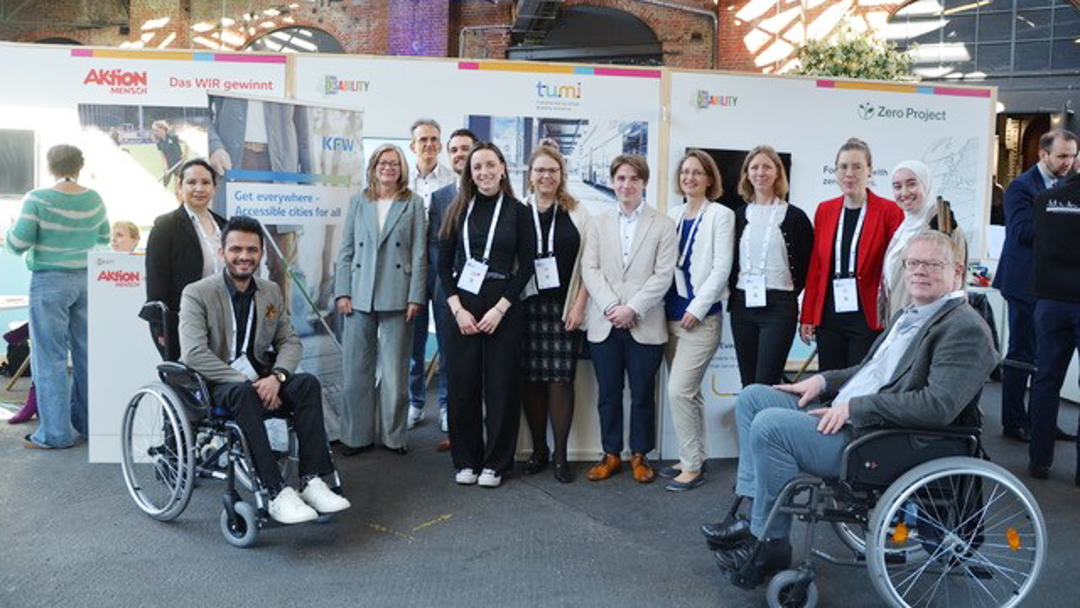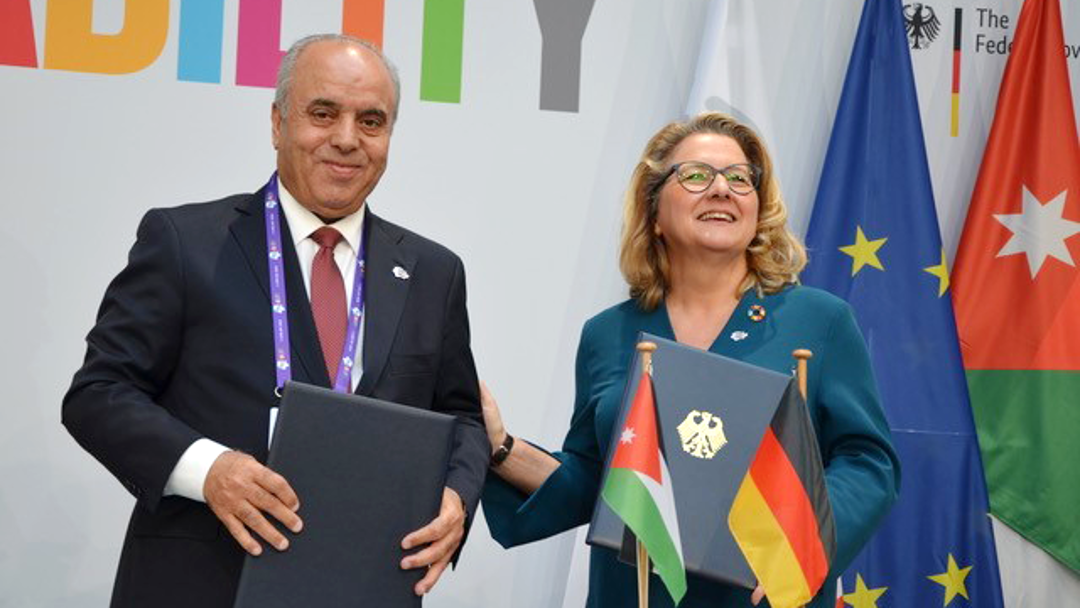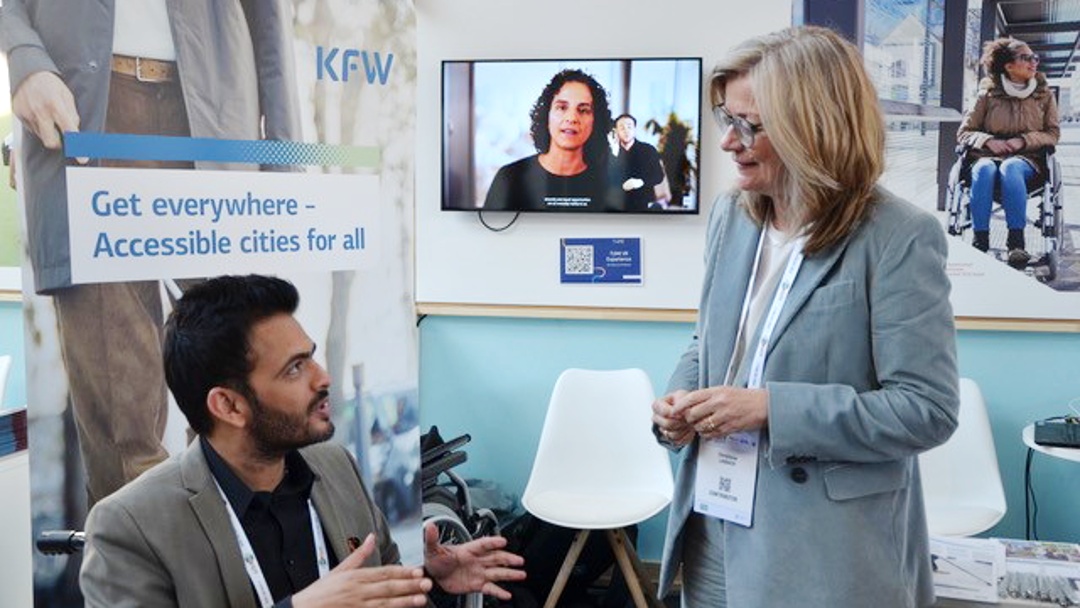News from 2025-04-04 / KfW Development Bank
KfW and Christiane Laibach at the Global Disability Summit in Berlin

The Global Disability Summit 2025 took place in Berlin on 2 and 3 April. This event is an important forum for international, national and regional actors, NGOs and representatives from the private sector to promote inclusion of people with disabilities and to share ideas regarding this issue. A delegation from KfW was also in attendance, including Member of the Executive Board Christiane Laibach.
The summit was organised as a cooperation between Germany, the Kingdom of Jordan and the International Disability Alliance. This was the third time it took place, providing a platform for people with disabilities to bring concerns to the table and develop solutions together. Particularly people from the global south, who are often overlooked in debates on this issue, were able to have their voices heard. With around 80% of the estimated 1.3 billion people with disabilities living in developing countries, this summit also contributed to a raising awareness about their concerns.
At the opening of the summit, King Abdullah II bin Al-Hussein of Jordan and Federal Chancellor Olaf Scholz emphasized the importance of inclusion for a sustainable and equitable development.
A 15% target as an outcome of the event
The cornerstone of the summit was the signing of the Amman-Berlin Declaration by more than 80 states. This declaration reaffirms the international-level commitment to the rights of people with disabilities and has set a new goal for development cooperation for 2028: under the slogan “15% for the 15%”, the aim is that 15% of the programmes in each country's portfolio should contribute to inclusion. In this way, the Amman-Berlin Declaration will help to further reduce barriers, so that all people can equally participate in society. Acting Federal Minister for Economic Cooperation and Development Minister Svenja Schulze signed the declaration on behalf of Germany.
At the Summit, Minister Schulze and Jordanian Minister of Education Azmy Mahmoud Mahafzah also signed a declaration of intent for a debt swap geared towards the education sector. It includes a total of EUR 46 million, of which EUR 5 million is earmarked for inclusion measures. Following a permit from BMZ, schools are being converted towards inclusion. In addition, magnet schools are being developed in which students with and without disabilities are taught together. All in all almost 15,000 pupils are expected to benefit, more than 2,100 with disabilities.

At the same time, the Federal Ministry for Economic Cooperation and Development (BMZ) presented details regarding some key successes from its work with respect to inclusion. For example, the proportion of projects in German development cooperation that take an inclusive approach, measured by total volume, has increased from 4% before 2024 to 11%. This is noteworthy, because inclusion as a cross-cutting issue is important for the SDGs, and thus also for the progress of many poor countries.
KfW presents itself as an inclusive company
There was also a delegation from KfW in Berlin. Executive Board Member Christiane Laibach visited the KfW stand and exchanged views with colleagues. She also took part in a panel on inclusive financing. There Christiane Laibach emphasized that KfW Development Bank has already expanded its inclusion portfolio, but much still needs to be done to structurally incorporate inclusion in the fundings as a cross-cutting issue. She said that inclusion aspects should in principle be considered regardless of sector, country context or financial instrument, but that it is particularly important to work closely with partner countries in this regard. Because the topic cannot be "predetermined" by the German side but requires ownership on both sides.

At KfW, this issue is playing a growing role not only in our portfolio, but also within the organisation itself. For example, there has been an inclusion task team (TTI) at the Development Bank since 2022, which has been able to network with various relevant actors at the summit and promote KfW as an inclusive employer.
TTI member Martin Schmid comments: "We are delighted that we have managed to give colleagues with disabilities a voice together with other implementing organisations and make their valuable work more visible in our organisations. Together with the World Bank, the International Labour Organisation (ILO) and GIZ/BMZ, we are working to make the field of development cooperation also attractive to colleagues with disabilities."
The next summit will take place 2028 in Qatar.

Share page
To share the content of this page with your network, click on one of the icons below.
Note on data protection: When you share content, your personal data is transferred to the selected network.
Data protection
Alternatively, you can also copy the short link: https://www.kfw-entwicklungsbank.de/s/enzBWrMC.DOKA
Copy link Link copied